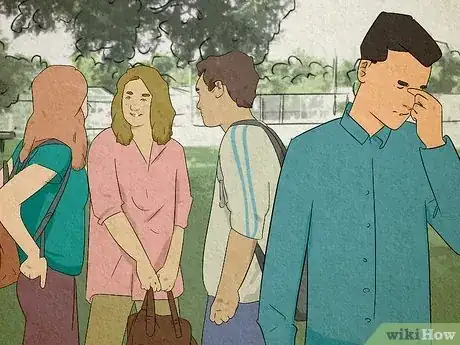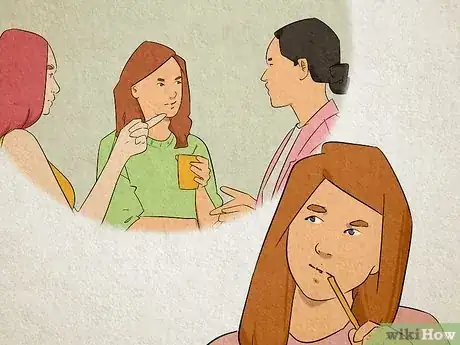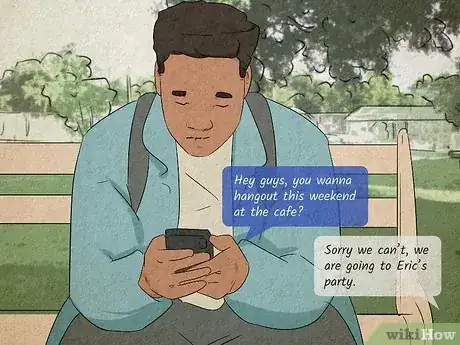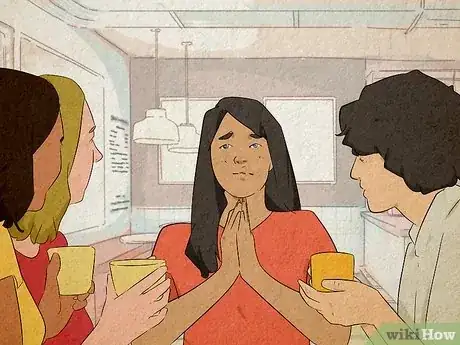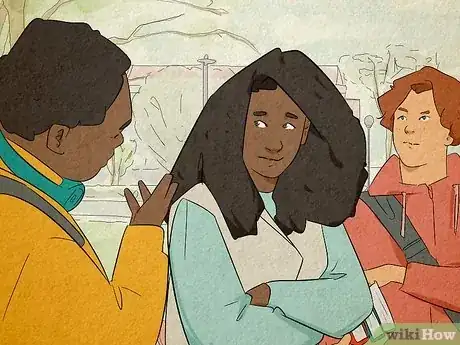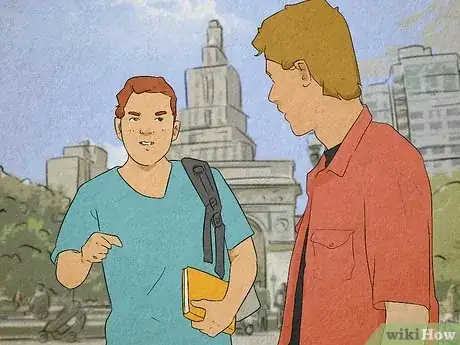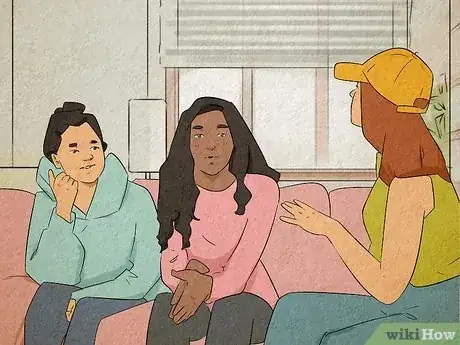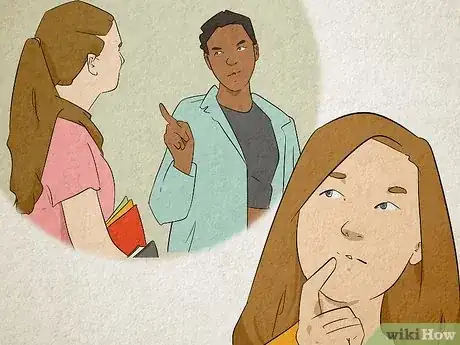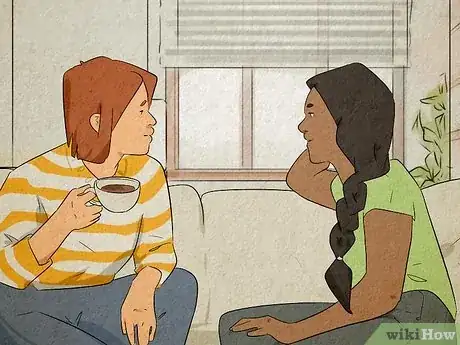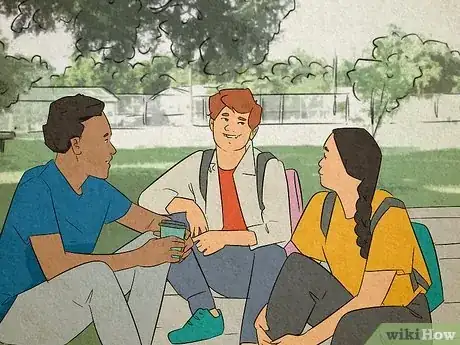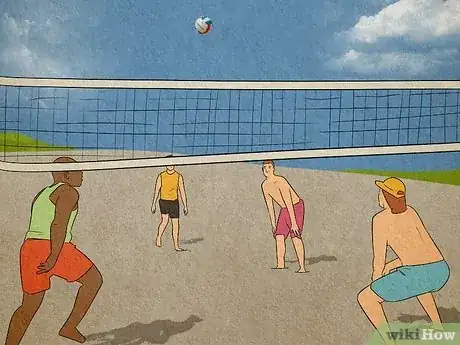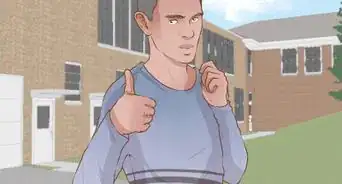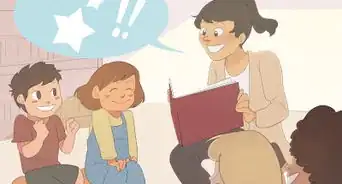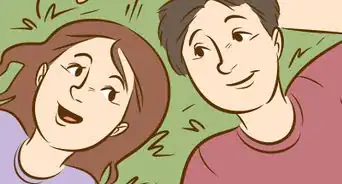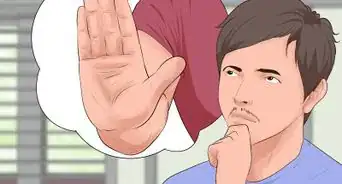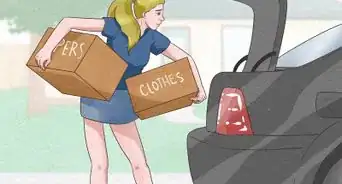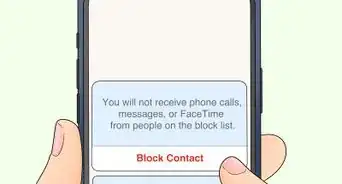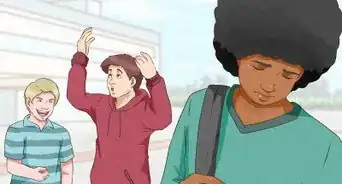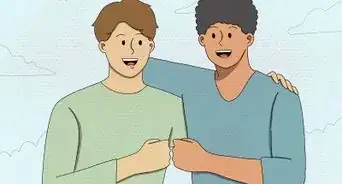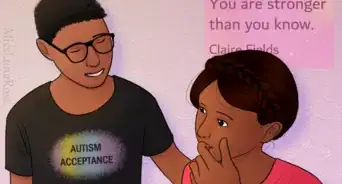This article was co-authored by Asa Don Brown, PhD, DNCCM, FAAETS. Dr. Asa Don Brown is a Clinical Psychologist with over 25 years of experience. He specializes in working with families, children, and couples, treating a variety of psychological disorders, trauma, and abuse. Dr. Brown has specialized in negotiation and profiling. He is also a prolific author having published three books and numerous articles in magazines, journals, and popular publications. Dr. Brown earned a BS in Theology and Religion with a minor in Marketing and an MS in Counseling with a specialization in Marriage and Family from The University of Great Falls. Furthermore, he received a PhD in Psychology with a specialization in Clinical Psychology from Capella University. He is also a candidate for a Masters of Liberal Arts through Harvard University. Dr. Brown is a Fellow of the American Academy of Experts in Traumatic Stress and a Diplomate for the National Center for Crisis Management and continues to serve a number of psychological and scientific boards.
There are 8 references cited in this article, which can be found at the bottom of the page.
This article has been viewed 334,946 times.
Friendships sometimes grow and sometimes fizzle out. If you think a friendship or friend group might be on the way out, look for some signs to know whether something’s up. You might be able to fix it or it might be time to say goodbye. If your friends are being mean to you or you feel like you’re being treated unfairly, it’s likely that the friendship has changed. It’s up to you what to do from here, but know that you can either repair the friendship or make new friends.
Steps
Assessing Your Friendships
-
1Decide if you are getting tired of them. When you suspect that your friends are getting tired of you, then it may be because you are tired of them. Ask yourself a few questions to find out if this is the case:
- Are you putting little effort into the relationship, such as not contacting them and not making plans?
- Do you feel bored when you are with them?
- Do you hope that plans with them get cancelled?
-
2Determine if your friends are excluding you. If your friends are tired of you, it’s likely that they’re starting to exclude you from things or ignore you.[1] You might notice that they feel more distant from you.[2] Even if they speak to you, it might be more out of convenience and they may not go out of their way to invite you to events.
- For example, your friends might hang out with you at school but exclude you on the weekends.
- Your friends may also ignore your texts, phone calls, or emails.[3]
- Before you decide your friends are excluding you, ask yourself if you are putting in the same effort you expect from them. If you don't invite them to do things, then they may not think to invite you.
Advertisement -
3Recognize if there have been bumps in your friendship recently. Sometimes, conflicts can lead to distance. For example, if you have had a fight with one or more of your friends, they may take some distance while things cool off. Taking some time apart is normal if you disagree about something. If time goes on and you haven’t made up or they say that things are fine but they’ve nearly stopped talking to you, this may indicate greater problems.
- Understanding the wider context can sometimes help you to see why your friends might be distancing themselves.
- If you have been apart because of an issue, reach out to them to start repairing your relationship. For example, apologize first after a fight.
-
4Pay attention to constant excuses. Excuses are a weak way of not saying openly what the person really thinks. You might still talk to your friends, but when it comes to having fun, they might make excuses for not wanting you to come. If the excuses keep adding up, this might be one way they’re indirectly telling you that they’re tired of you.[4]
- If the excuses don’t quite make sense, the person might use them to create distance or spend some time apart from you.
-
5Evaluate your need for approval. If you’re always looking for approval, your friends might get tired of affirming you. Saying things like, “We’re best friends, right?” or, “You’re going to invite me to that party, aren’t you?” can be exhausting. While you want to feel accepted and included, don’t go actively seeking that inclusion.[5]
- If you find yourself asking for validation from your friends, step back. If you’re worried about the friendship ending and want constant reassurance, it can turn into a self-fulfilling prophesy in no time.
- Make sure that you are not being needy. Spend time working on things that are special to you instead of asking for others to validate you.
-
6Notice bullying behavior. Some people might be nice to you sometimes and mean to you at other times. If these friends call you names, steal from you, or talk about you behind your back, this isn’t friendship behavior. This sounds more like bullying than friendship.[6]
- Other bullying behavior might include gossiping, spreading rumors, or purposefully embarrassing you.
-
7Pay attention to hurtful words. You might find yourself the butt of the jokes or notice that your friends put you down. If you say something, they might tell you to stop being sensitive or that you can’t take a joke. Friends do not mock or insult friends. This could be a serious sign that they're trying to exclude you.[7]
- You might laugh along but really feel insecure or unhappy that they’re making fun of you.
- If your friends say hurtful things about you, say, "I don't think that's funny. In fact, it's really rude and hurtful." If they continue to say these things, then they aren't being good friends.
- Feeling like you fit in with these friends isn’t worth being put down or made fun of.
Responding to Distant Friends
-
1Be realistic. Don't kid yourself that they still are great friends if they’ve stopping inviting you out or act as though they don’t care about you. It can be hard to accept that your friendship has changed or that the people you thought were friends aren’t great friends to you. Just don’t hang around nasty people because you want to feel accepted.
- If you friends are being mean, don’t feel like you need them or you must win them back. If they aren’t treating you well, it’s best to accept the end of the friendship and make new friends.
- As you grow and change as a person, you might not have as much in common with your old friends. That's perfectly okay![8]
EXPERT TIPDr. Adam Dorsay is a licensed psychologist in private practice in San Jose, CA, and the co-creator of Project Reciprocity, an international program at Facebook's Headquarters, and a consultant with Digital Ocean’s Safety Team. He specializes in assisting high-achieving adults with relationship issues, stress reduction, anxiety, and attaining more happiness in their lives. In 2016 he gave a well-watched TEDx talk about men and emotions. Dr. Dorsay has a M.A. in Counseling from Santa Clara University and received his doctorate in Clinical Psychology in 2008.Licensed Psychologist & TEDx Speaker
 Adam Dorsay, PsyD
Adam Dorsay, PsyD
Licensed Psychologist & TEDx SpeakerTake a step back and ask yourself, "Is this a relationship that's working? Are we helping each other? Is this friendship one-sided?" Spending time on a friendship that's going downhill actually doesn't serve you. Don't invest time in a relationship that isn't good for you.
-
2Talk to your friends. A mature way to approach the situation is through talking and communicating clearly.[9] Ask them why they are behaving that way and how it makes you feel. It is possible that they haven't realized that their actions are rude or unfriendly. In some cases, a friend may be feeling sick or having troubles of their own and is lashing out instead of thinking clearly.
- Use “I” statements and avoid being defensive or blaming. For example, say, “It hurts my feelings when I’m left out. What’s going on?”[10]
- Avoid blaming, criticizing, or becoming defensive.
-
3Reflect on useful feedback. While some people say things because they are mean, your friends might have some valuable feedback you can reflect upon. If they’re being honest and not trying to be mean, try to see things from their perspective. For example, if they say that you chew loudly and don’t want to invite you to eat, try not to get too offended. Instead, make an effort to chew with your mouth closed.
- If they say things just to be mean and it seems like their statements are an attack on you, disregard what they say.
-
4Invite your friends over for some fun. If you feel like your friends are distant, invite them over to have some fun with you. You could have a movie night, a sleepover or play games together. If you all get together and have a good time, you might be able to resolve any issues and start over. However, be aware that this isn't a good solution if your friends are constantly being nasty.
- If you keep inviting them over and they keep rejecting the invitation, it's time to move on or talk to them.
-
5Work on building your friendship skills. Friendship and social skills are important to maintaining and building your friends group. Ask yourself what qualities you want in a friend, then make an effort to be those things. Look for people who treat you the way you want to be treated and aim to treat them well, too.[11]
- For example, aim to be caring, reliable, and a good listener. Look for people who respond the same way.
-
6Move on and make new friends. You might realize that the friendship is over and want to invite new friends in your life. It can be fun and exciting to make new friends and give you new opportunities to learn and grow. It'll take time to heal and find new friends, but you will find other people. Be open to seeing who else is out there looking to connect. At the end of the day, it is important to be around people who actually want to be your friends, and who care about you.[12]
- If you’re not sure where to make friends, get involved in activities at school or outside of school such as sports teams, hobbies, and volunteering.
- Remember: it's okay to feel sad when a friendship ends![13]
-
7Choose an environment that will attract the right friends. You will meet positive people who have the qualities you desire in a friend by going places where they frequent, such as charitable organizations, after-school activities, or recreational groups. Look for friends and acquaintances that have characteristics you value, such as honesty and generosity.
- Try meetup.com to look for local groups.
- If you're in school, look for clubs and organizations that match your hobbies or give back to the community.
Expert Q&A
Did you know you can get expert answers for this article?
Unlock expert answers by supporting wikiHow
-
QuestionIs it normal to lose high school friends?
 Lena Dicken, Psy.DDr. Lena Dicken is a Clinical Psychologist based in Santa Monica, California. With over eight years of experience, Dr. Dicken specializes in therapy for anxiety, depression, life transitions, and relationship difficulties. She utilizes an integrative approach combining Psychodynamic, Cognitive Behavioral, and Mindfulness-based therapies. Dr. Dicken holds a BS in Integrative Medicine from the University of Hawaii at Manoa, an MA in Counseling Psychology from Argosy University Los Angeles, and a Doctor of Psychology (Psy.D) in Clinical Psychology from the Chicago School of Professional Psychology at Westwood. Dr. Dicken’s work has been featured in GOOP, The Chalkboard Magazine, and in numerous other articles and podcasts. She is a licensed psychologist with the state of California.
Lena Dicken, Psy.DDr. Lena Dicken is a Clinical Psychologist based in Santa Monica, California. With over eight years of experience, Dr. Dicken specializes in therapy for anxiety, depression, life transitions, and relationship difficulties. She utilizes an integrative approach combining Psychodynamic, Cognitive Behavioral, and Mindfulness-based therapies. Dr. Dicken holds a BS in Integrative Medicine from the University of Hawaii at Manoa, an MA in Counseling Psychology from Argosy University Los Angeles, and a Doctor of Psychology (Psy.D) in Clinical Psychology from the Chicago School of Professional Psychology at Westwood. Dr. Dicken’s work has been featured in GOOP, The Chalkboard Magazine, and in numerous other articles and podcasts. She is a licensed psychologist with the state of California.
Clinical Psychologist
-
QuestionHow do you tell if your friend is no longer your friend?
 Asa Don Brown, PhD, DNCCM, FAAETSDr. Asa Don Brown is a Clinical Psychologist with over 25 years of experience. He specializes in working with families, children, and couples, treating a variety of psychological disorders, trauma, and abuse. Dr. Brown has specialized in negotiation and profiling. He is also a prolific author having published three books and numerous articles in magazines, journals, and popular publications. Dr. Brown earned a BS in Theology and Religion with a minor in Marketing and an MS in Counseling with a specialization in Marriage and Family from The University of Great Falls. Furthermore, he received a PhD in Psychology with a specialization in Clinical Psychology from Capella University. He is also a candidate for a Masters of Liberal Arts through Harvard University. Dr. Brown is a Fellow of the American Academy of Experts in Traumatic Stress and a Diplomate for the National Center for Crisis Management and continues to serve a number of psychological and scientific boards.
Asa Don Brown, PhD, DNCCM, FAAETSDr. Asa Don Brown is a Clinical Psychologist with over 25 years of experience. He specializes in working with families, children, and couples, treating a variety of psychological disorders, trauma, and abuse. Dr. Brown has specialized in negotiation and profiling. He is also a prolific author having published three books and numerous articles in magazines, journals, and popular publications. Dr. Brown earned a BS in Theology and Religion with a minor in Marketing and an MS in Counseling with a specialization in Marriage and Family from The University of Great Falls. Furthermore, he received a PhD in Psychology with a specialization in Clinical Psychology from Capella University. He is also a candidate for a Masters of Liberal Arts through Harvard University. Dr. Brown is a Fellow of the American Academy of Experts in Traumatic Stress and a Diplomate for the National Center for Crisis Management and continues to serve a number of psychological and scientific boards.
Clinical Psychologist The signs may be subtle or blatant. The challenge occurs when they are being faintly communicated through verbal or nonverbal cues. Remember that not all relationships can be blanketed with the same cover. A long term relationship is different from a causal relationship, and you cannot have the same expectations for a short-term or casual relationship as you may have for a long term relationship. Take this into consideration when evaluating the situation.
The signs may be subtle or blatant. The challenge occurs when they are being faintly communicated through verbal or nonverbal cues. Remember that not all relationships can be blanketed with the same cover. A long term relationship is different from a causal relationship, and you cannot have the same expectations for a short-term or casual relationship as you may have for a long term relationship. Take this into consideration when evaluating the situation. -
QuestionHow do you accept losing a friend?
 Asa Don Brown, PhD, DNCCM, FAAETSDr. Asa Don Brown is a Clinical Psychologist with over 25 years of experience. He specializes in working with families, children, and couples, treating a variety of psychological disorders, trauma, and abuse. Dr. Brown has specialized in negotiation and profiling. He is also a prolific author having published three books and numerous articles in magazines, journals, and popular publications. Dr. Brown earned a BS in Theology and Religion with a minor in Marketing and an MS in Counseling with a specialization in Marriage and Family from The University of Great Falls. Furthermore, he received a PhD in Psychology with a specialization in Clinical Psychology from Capella University. He is also a candidate for a Masters of Liberal Arts through Harvard University. Dr. Brown is a Fellow of the American Academy of Experts in Traumatic Stress and a Diplomate for the National Center for Crisis Management and continues to serve a number of psychological and scientific boards.
Asa Don Brown, PhD, DNCCM, FAAETSDr. Asa Don Brown is a Clinical Psychologist with over 25 years of experience. He specializes in working with families, children, and couples, treating a variety of psychological disorders, trauma, and abuse. Dr. Brown has specialized in negotiation and profiling. He is also a prolific author having published three books and numerous articles in magazines, journals, and popular publications. Dr. Brown earned a BS in Theology and Religion with a minor in Marketing and an MS in Counseling with a specialization in Marriage and Family from The University of Great Falls. Furthermore, he received a PhD in Psychology with a specialization in Clinical Psychology from Capella University. He is also a candidate for a Masters of Liberal Arts through Harvard University. Dr. Brown is a Fellow of the American Academy of Experts in Traumatic Stress and a Diplomate for the National Center for Crisis Management and continues to serve a number of psychological and scientific boards.
Clinical Psychologist
References
- ↑ Asa Don Brown, PhD, DNCCM, FAAETS. Clinical Psychologist. Expert Interview. 22 August 2022.
- ↑ https://www.ditchthelabel.org/are-they-really-your-friend-15-signs-that-suggest-otherwise/
- ↑ Asa Don Brown, PhD, DNCCM, FAAETS. Clinical Psychologist. Expert Interview. 22 August 2022.
- ↑ Asa Don Brown, PhD, DNCCM, FAAETS. Clinical Psychologist. Expert Interview. 22 August 2022.
- ↑ https://psychcentral.com/blog/archives/2012/09/20/what-drives-our-need-for-approval/
- ↑ https://www.stopbullying.gov/what-is-bullying/definition/index.html#types
- ↑ https://www.ditchthelabel.org/are-they-really-your-friend-15-signs-that-suggest-otherwise/
- ↑ Lena Dicken, Psy.D. Clinical Psychologist. Expert Interview. 15 December 2020.
- ↑ Asa Don Brown, PhD, DNCCM, FAAETS. Clinical Psychologist. Expert Interview. 22 August 2022.
- ↑ http://www.goodtherapy.org/blog/psychpedia/i-message
- ↑ http://www.cyh.com/HealthTopics/HealthTopicDetailsKids.aspx?p=335&id=1636&np=286
- ↑ https://www.helpguide.org/articles/relationships-communication/making-good-friends.htm
- ↑ Lena Dicken, Psy.D. Clinical Psychologist. Expert Interview. 15 December 2020.
About This Article
To tell if your friends are getting tired of you, pay attention to how often they hang out without you, since they might have lost interest in you if they never invite you to hang out. Another way to find out is to invite your friends over for a movie night or to play games. If they turn down your invitation on multiple occasions, they’re probably not very interested in staying friends with you. You can also just ask your friends why they're not spending much time with you. For example, say something like, “I feel like we’ve been pretty distant recently. I just wondered if something was up?” If they admit they'd rather spend time with other people, don't let that get your down, since you can easily make new friends with people who will want to hang out with you. For more tips from our co-author, including how to make some new friends, read on!
